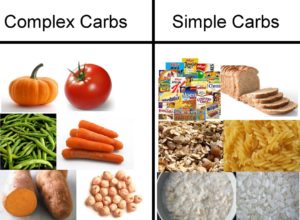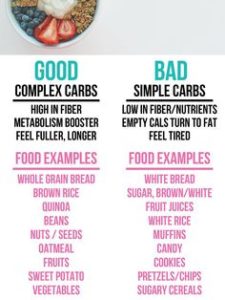
Many thanks to my friends Michelle Davidson and Joel Nichols for welcoming me every other Thursday morning to discuss what we can do each day to be proactive, healthy, and happy! I am so grateful for the opportunity to share!
This week we talked about “Good” vs “Bad” Carb choices and why they really do matter to our waistlines and health!
We only had time to discuss a portion of what I wanted to say about carbs. Here’s what wasn’t on the show…WHAT ARE CARBS?
 Carbohydrates, or carbs, are one of three macronutrients that provide the body with energy. The other two are protein and fat. Carbohydrates job is to provide energy for the cells and body.
Carbohydrates, or carbs, are one of three macronutrients that provide the body with energy. The other two are protein and fat. Carbohydrates job is to provide energy for the cells and body.
- Sugars: Individual sugar molecules or short chains of sugar molecules. These include glucose, fructose, galactose and sucrose.
- Starches: Longer chains of carbohydrate molecules that need to be broken down in the digestive system.
- Fiber: Carbohydrates that the body cannot digest.
Not all Carbs are Created Equal
 Complex carbs: Carb-containing foods that are in their whole, unprocessed form. Foods in this category include fruits, vegetables and legumes.
Complex carbs: Carb-containing foods that are in their whole, unprocessed form. Foods in this category include fruits, vegetables and legumes.- Simple carbs: Sugars and starches that have been refined and stripped of their natural fiber and nutrients.
 Health benefits of Complex Carbs
Health benefits of Complex Carbs
Complex Carbs Are Less Likely to Cause Blood Sugar Spikes. Fiber-rich, complex carbs take much longer to break down than simple carbs. This helps keep blood sugar levels steady, as sugar reaches the bloodstream gradually. Because complex carbs are digested more slowly, they provide sustained energy and help you feel fuller longer.
Simple carbs are digested very quickly, which causes a spike in your blood sugar. The blood sugar spike stimulates your pancreas to release a large dose of insulin, which often leads to a blood sugar “crash,” leaving you hungry and craving more sugar.
Complex Carbs May Reduce Your Risk of Some Chronic Diseases
Consuming complex carbs may help lower your risk of chronic diseases, such as diabetes and heart disease. They tend to be high in dietary fiber, vitamins, minerals, antioxidants and plant compounds. All of these components play a role in disease prevention.
Furthermore, studies have found that eating whole foods high in dietary fiber may lower “bad” LDL cholesterol and blood sugar levels, as well as help raise “good” HDL cholesterol.
Complex Carbs Promote a Healthier Digestive System
 There are billions of “good” bacteria lining your intestines. They’re known as your gut microbiota. They play a role in managing several digestive disorders and have been linked to various other aspects of health.
There are billions of “good” bacteria lining your intestines. They’re known as your gut microbiota. They play a role in managing several digestive disorders and have been linked to various other aspects of health.
Soluble fibers found in complex carbs feed the beneficial bacteria and increase their presence in your gut. They also help the bacteria produce nutrients, such as short-chain fatty acids, which are beneficial for digestive health.
Complex Carbs May Reduce Inflammation
 Inflammation is the body’s natural response to infection or injury. However, long-term inflammation can increase the risk of several chronic diseases. While sugary foods and refined flours promote inflammation, complex carbs help reduce inflammation.
Inflammation is the body’s natural response to infection or injury. However, long-term inflammation can increase the risk of several chronic diseases. While sugary foods and refined flours promote inflammation, complex carbs help reduce inflammation.
Single-ingredient whole grains, fruits, vegetables and legumes contain fiber and plant compounds that have anti-inflammatory properties.
Simple Carbs Can Be Detrimental to Your Health
 Simple carbs like refined grains and added sugars are horrible for your body.
Simple carbs like refined grains and added sugars are horrible for your body.
- They contribute to overeating: Simple carbs break down quickly and cause a blood sugar roller coaster. Studies have found that these blood sugar spikes and crashes contribute to cravings, hunger and overeating.
- High triglyceride levels: Large amounts of refined carbs can lead to elevated triglyceride levels, which increase the risk of heart disease and type 2 diabetes.
 Increased heart disease risk: Sugar and refined grains increase heart disease risk. A study found those who ate the most refined grains were 2–3 times more likely to develop heart disease than those who ate the least.
Increased heart disease risk: Sugar and refined grains increase heart disease risk. A study found those who ate the most refined grains were 2–3 times more likely to develop heart disease than those who ate the least.- Increased risk of type 2 diabetes: Excessive consumption of simple carbs can cause your cells to become resistant to insulin, which greatly increases your risk of type 2 diabetes.
- Sugar is addictive for some people: Similarly to recreational drugs, sugar causes the brain to release dopamine. For people that are prone to addiction, sugar can be highly addictive.
- Increased chance of becoming obese: Simple carbs harm the hormones that regulate appetite, making them likely to contribute to obesity.
As a card carrying carb lover myself, I have learned to respect the immense power of my food choices not only on how I look, but more importantly how I feel and function. Eat carbs because they are good for you! But choose wisely because some are much better than others!
Hmm is anyone else encountering problems with the images on this blog loading?
I’m trying to figure out if its a problem on my end or if it’s the blog.
Any feedback would be greatly appreciated.
I’d like to thank you for the efforts you have put in writing this blog.
I am hoping to check out the same high-grade blog posts by you later on as well.
In fact, your creative writing abilities has inspired me to get my
own, personal blog now 😉